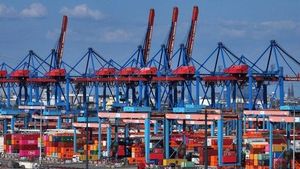Funding cuts to asylum seeker legal assistance services are causing serious concern throughout the Netherlands. The independent legal guidance provided by VluchtelingenWerk Nederland (VWN) is at risk of vanishing following significant reductions by the Ministry of Justice.
Abdul Rahman, 29, from Syria, has recently experienced firsthand the support offered by VWN at their local office situated under the asylum seekers’ center on Joseph Haydnlaan in Utrecht. He brought forth numerous documents for legal processing, including his marriage certificate and the birth certificates of his children. Without the assistance from VWN, Rahman admits he would not have known how to navigate the complex legal system concerning his family reunification request, stating, "I can’t do it without them".
These statements come at a time when the Dutch government has slashed funding for organizations like VWN, which are pivotal for asylum seekers. According to VWN, this year's allocated budget is reduced to just 13 million euros, down from the 23 million euros received last year and significantly short of the 34 million euros necessary to maintain adequate services. Minister for Migration and Justice, Marjolein Faber, made this announcement early January, which was unexpected and abrupt.
Frank Candel, the chairman of VWN, has expressed his discontent with what he termed "maladministration", emphasizing how Faber's late disclosure of the cutbacks compromises their operations. He fears the asylum system may become even more bogged down, leading to increased operational costs as asylum seekers, deprived of adequate preparations, will face higher denial rates and will have to pursue lengthy appeals. This sentiment has been echoed across the political spectrum, with both left and right opposition parties condemning the funding reductions. CDA leader Henri Bontenbal termed these cuts as "Trumpian" – drastic and made without proper consultation.
During the parliamentary questioning of Minister Faber, she evaded many inquiries, indicating her reluctance to influence the court case VWN has filed against the government over the cuts. This legal action hopes to establish transitional provisions to soften the impact of the funding diminishment. VWN faces the harsh reality of having to phase out their operations come March, leading to the imminent layoff of staff members, including team leaders like Marij Burg.
Burg, emotionally burdened by the news, voiced her fears for those asylum seekers who rely heavily on the assistance provided by VWN. She reminisced about cases where vulnerable individuals, fleeing harassment and persecution for their sexual orientation, felt too intimidated to share their full stories with their appointed legal counsel. When such stories were eventually disclosed through the support of VWN, their subsequent applications met with success, showcasing the indispensable role of legal aides during these tough times.
The system is under strain as the availability of qualified legal representatives remains limited, leading to inadequate legal representation for many asylum seekers. Burg highlighted the uphill battle her colleagues face to connect with the most vulnerable populations, like single mothers and minors, particularly when some emergency shelter sites lack any VWN presence. She often finds herself biking across the city to provide on-the-spot assistance, encountering long queues of people needing help.
While Burg prepares for her eventual departure from VWN, she remains dedicated to leaving behind the best possible service for her clients. Looking forward, her prospects appear uncertain, with minimal openings available for roles assisting refugees amid the current political climate.
Rahman’s situation is poignant, underscoring the often-overlooked significance of legal support for asylum seekers. "When you arrive in the Netherlands, you hear from others to trust VWN," he stated. "They take their time with me and often call interpreters. I fear miscommunication and the potential fallout from misunderstandings. This organization offers the security I need." The anxiety surrounding these funding cuts only intensifies as more asylum seekers turn to VWN for guidance, highlighting the urgent need for adequate legal resources to protect their rights and secure their futures.
With their current funding model under intense scrutiny, it remains to be seen how VWN will navigate this challenging transition and what the long-term ramifications will be for asylum seekers across the country.



